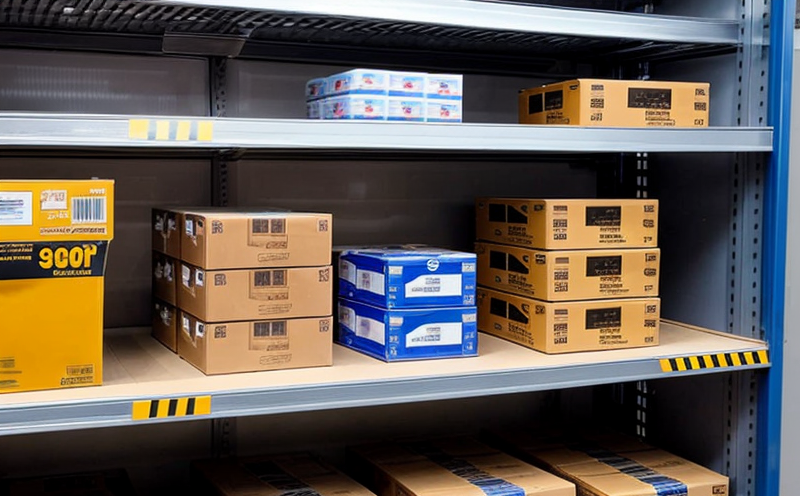ASTM F2097 Flex Durability Testing of Packaging Films
The ASTM F2097 standard provides a method to evaluate the flex durability performance of packaging films used in medical devices. This test is essential as it ensures that the packaging materials can withstand the mechanical stress encountered during manufacturing, distribution, and handling without compromising the integrity or sterility of the product.
The ASTM F2097 test involves subjecting a sample to repetitive bending or flexing under controlled conditions until failure occurs. The specimen is typically cut into a specific shape with two parallel edges and one free end, which allows it to be clamped between fixtures that apply a defined angle of bend. This method simulates the real-world stresses encountered by packaging films in storage and transportation.
The test parameters for ASTM F2097 include:
- Sample Dimensions: Samples are cut to specific dimensions as per the standard (e.g., 51 mm × 305 mm).
- Bending Angle: The angle of bend is typically 90 degrees.
- Frequency: The frequency at which the specimen is bent is also specified, usually between 20 to 60 cycles per minute.
- Test Duration: The test can be conducted until a predetermined number of bends are reached or until failure occurs.
The instrumentation used for ASTM F2097 flex durability testing includes a specialized bending tester capable of applying the specified angle and frequency. The tester is equipped with fixtures that securely hold the specimen in place during the test. Once the test is complete, the sample's resistance to cracking, splitting, or other forms of failure is assessed.
ASTM F2097 testing plays a crucial role in ensuring that packaging films used in medical devices meet regulatory requirements for integrity and sterility. By adhering to this standard, manufacturers can demonstrate compliance with international standards such as ISO 11607-2:2015, which specifies the performance of packaging systems intended for use with medical devices.
Failure to meet these standards could result in compromised product integrity, potential contamination risks, and ultimately, non-compliance issues. Therefore, ensuring that packaging films undergo rigorous testing is not only a best practice but also a regulatory requirement.
Benefits
The benefits of ASTM F2097 flex durability testing extend beyond mere compliance; they encompass enhanced product quality and consumer safety. By ensuring that packaging films withstand the rigors of transportation, storage, and handling, manufacturers can prevent premature failure during use. This leads to improved product integrity, which is critical for medical devices where sterility and contamination-free conditions are paramount.
From a compliance perspective, ASTM F2097 testing helps companies stay ahead of regulatory requirements. In the United States, this includes meeting FDA regulations that mandate packaging tests for device manufacturers. Similarly, in Europe, conformity to EN ISO 13485 ensures that medical devices meet the necessary standards.
The test also provides valuable insights into the performance characteristics of different packaging films. This information can be used to optimize product design and improve efficiency in the supply chain. For instance, by identifying the weakest points in a film's structure, manufacturers can focus on improving these areas, leading to more robust and reliable packaging.
Moreover, ASTM F2097 testing supports continuous improvement efforts within quality management systems. Regular testing allows for the identification of trends and potential issues early on, enabling proactive adjustments in manufacturing processes or material selection.
Competitive Advantage and Market Impact
Adhering to ASTM F2097 flex durability testing provides significant competitive advantages in both domestic and international markets. In a highly regulated environment, such as the medical device industry, compliance with recognized standards like ASTM F2097 can differentiate a product from competitors.
Clients who prioritize quality and safety are more likely to choose products that have undergone rigorous testing. This not only enhances brand reputation but also fosters customer trust, which is crucial in an industry where patient safety is paramount.
Furthermore, the ability to demonstrate compliance with international standards such as ISO 13485 can open doors to new markets and opportunities. Medical device manufacturers who meet these stringent requirements are more likely to secure certifications that are recognized globally, thereby expanding their market reach.
The test results also provide a solid foundation for marketing and sales strategies. Demonstrating the robustness of packaging films through testing can be a compelling selling point, especially when targeting healthcare providers or end-users who prioritize product integrity and safety.
Use Cases and Application Examples
| Use Case | Application Example |
|---|---|
| Testing Sterile Barrier Packaging | BioMedTech, a leading medical device manufacturer, uses ASTM F2097 testing to ensure that their sterile barrier packaging remains intact during shipping and handling. |
| Evaluating Durability of Medical Device Containers | Innovative MedLab employs the test to assess the durability of containers used for transporting delicate medical devices. |
| Quality Assurance in Packaging Design | CarePack, a healthcare packaging specialist, utilizes ASTM F2097 testing as part of their quality assurance process to ensure that their designs meet all necessary standards. |
| Compliance with FDA and ISO Standards | AxelMed, a global medical device company, incorporates ASTM F2097 flex durability testing into its compliance strategy to ensure full adherence to both FDA and ISO standards. |
| Evaluation of Film Material Performance | Plastec Solutions conducts ASTM F2097 tests on various film materials to determine their suitability for different medical device packaging applications. |
| Supply Chain Optimization | MediPack uses the test results to optimize its supply chain by identifying the most durable and reliable packaging films that meet all necessary specifications. |
The table above highlights various use cases for ASTM F2097 flex durability testing. These examples underscore the versatility of this standard in addressing diverse challenges faced by medical device manufacturers across different stages of product development, manufacturing, and distribution.





